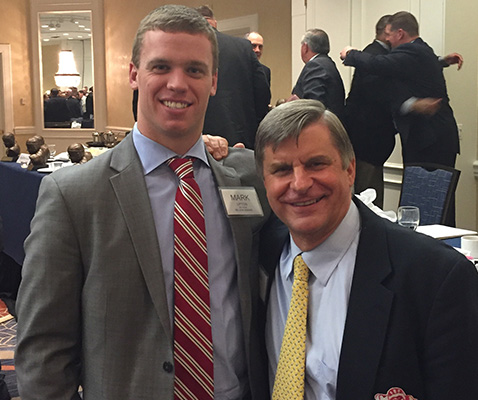Graber News
March 2017
March 8
Webinar presented by Ray Graber
Payment System Policy: FFIEC, Risk Management, & Fraud Control
Is your financial institution or corporation ready for the future? The payments landscape and regulatory climate continues to undergo dramatic change and now is the time to plan for what’s coming. This webinar is tailored to help you understand how strategic planning and risk management impact driving growth, managing regulatory uncertainty, and moving into the future while protecting your business.
This session allows for a dynamic exchange of ideas related to payments strategies and risk management programs and serves as a unique opportunity for financial institutions and corporations to gain insight and prepare for the future.
March 23
Webinar hosted by
ComplianceKey, delivered by Ray Graber
Fraud in some payment types are declining while others are picking up that slack. ACH, CHIPS, and Fedwire payments are taking the place of B2B checks but there exists compliance and fraud issues in all of them.
This session is a cost-effective way to understand that the U.S. B2B payments industry is struggling with an identity crisis. Regulatory authorities are demanding that the payments industry tighten their reins on the adherence to regulations and compliance mandates; technology is enabling payments providers, banks, and networks to venture further into new frontiers; practitioners are worried about security; and infrastructures are getting old and in need of repair or replacement.
We will discuss how to mitigate the losses and manage all of the attacks from various fraudsters across payment types.
February 2017
February 7
Webinar presented by Ray Graber
Part II provides additional validation steps to verify the effectiveness of a financial institution's internal control processes over ACH, EFT/POS networks, check items, electronic banking related retail payments, and bankcard processing, clearance, and settlement. These procedures assist in achieving examination objectives, and examiners may use them in their entirety or selectively, depending upon the scope of the examination and the need for additional verification.
The procedures provided in this session should not be construed as requirements for control implementation. The selection of controls and control implementation should be guided by the risk profile of the institution.
Bank staff being examined should coordinate with other departments involved in assessing the institution's information systems, operations, information security, and vendor management effectiveness to ensure there is an adequate understanding of the control environment as it pertains to retail payment business lines and to avoid duplication of effort.
February 8
Webinar presented by Ray Graber
Passing on interchange fees has always been against card network regulations and companies have found unique ways to get around the regulations or simply did not comply. An anti-trust lawsuit was filed in 2005 and in July 13, 2012 the suit was finally settled.
Credit card surcharging is prohibited in ten (10) states while other states are considering legislation. The regulations are daunting for charging a surcharge; should you consider it to recoup transaction fees?
January 2017
January 18th
The role of the compliance officer is changing because banks are struggling to serve many masters; some with like goals and others with contradictory ones. Regulators, corporate clients, Board of Directors, and shareholders are pulling in their own directions. Fraud in some payment types are declining while others are picking up that slack. ACH, CHIPS, and Fedwire payments are taking the place of B2B checks but there exists compliance and fraud issues in all of them.
The B2B payments industry in the US is struggling with an identity crisis. Regulatory authorities are demanding that the payments industry tighten their reins on the adherence to regulations and compliance mandates; technology is enabling payments providers, banks, and networks to venture further into new frontiers; practitioners are worried about security; and infrastructures are getting old and in need of repair or replacement. The task of replacing these systems is so daunting; no wonder no one wants to launch a project to overhaul the enterprise payments network within the business or within the banks.
January 26th
This webinar will discuss several key areas to investigate, how to uncover fraud, and put a plan in place to prevent it going forward. We will cover duplicate payments where a simple quarterly scan can uncover potential issues. By identifying some strategic areas to review, you can educate your staff on what to look for and modify some applications, either internal or vendor developed, to identify potential hazards. With these two steps alone, you may be able to pinpoint leakages that otherwise may go unnoticed.
December 2016
December 15, 2016
Tom Burke served as Master of Ceremonies at the Gridiron Club of Greater Boston’s annual Bob Whelan College Football Awards Night that closed out the local college season.
Tom and Gridiron Club president Jim Kearney presented the 78th annual Bulger Lowe Award for defense to Boston College junior Harold Landry, chosen best defensive player in Division One in New England.
Tom and Jim also presented the award for top assistant coach in Division One to Boston College special teams coach Al Washington.
Tom is with Mark Upton of Bates College and Winthrop, Mass. Mark won the Division II/III Swede Nelson Award, the 71st annual, which goes to the best student-athlete/sportsman/citizen in New England.
December 9, 2016
Bitcoins have been adopted by a wide range of user – the good, the bad, and the ugly. Understanding how they and the block chain operate is essential to preparing for is further adoption and incorporation into financial society.
Bitcoins have gotten much more traction than early detractors and pundits expected. With that reality, what do banks need to do, if anything, to prepare for their existence and surprising acceptance?
This session will present the fundamental workings of virtual currencies with an emphasis on bitcoin and the current state of the regulatory front. We will get your thinking caps energized as to how bankers might approach virtual currencies and some thoughts about what the future might hold for bitcoin.
It appears that Bitcoin and blockchain are here to stay – what does that mean to your institution?
Banks are pumping huge amounts of money into systems designed to prevent money laundering, but the blockchain could help by recording each leg of a transaction, making its ultimate destination easier to trace. Once you understand the fundamentals, you will be able to determine what this means to your institution.



